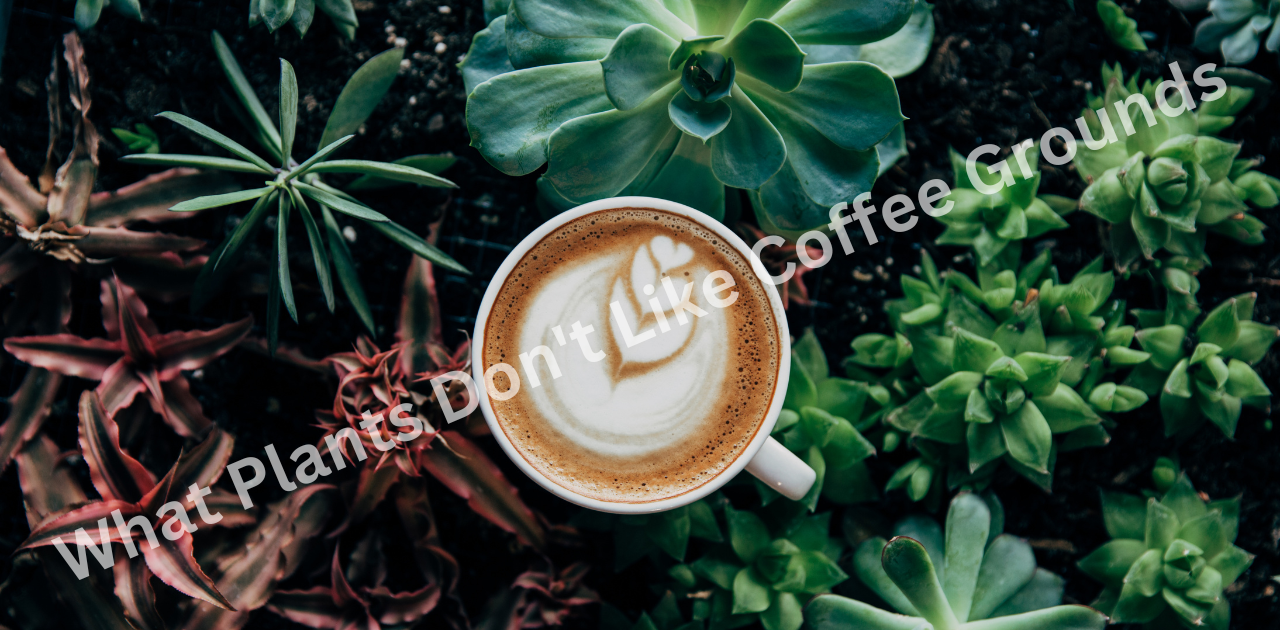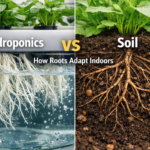Coffee grounds are popular among gardeners looking to add organic material to their soil. They are rich in nitrogen and can help improve soil structure and drainage and even deter some pests. However, not all plants respond well to the addition of coffee grounds. Understanding which plants don’t like coffee grounds is crucial for maintaining a healthy garden. Coffee grounds are slightly acidic and can alter the soil pH, making it unsuitable for plants that prefer alkaline conditions.
Additionally, the high nitrogen content can be too much for some plants, leading to poor fruit production or overly lush foliage at the expense of flowers and fruit. Some plants are also sensitive to caffeine, which can inhibit their growth. By knowing which plants to avoid using coffee grounds on, you can make more informed decisions and ensure that all your plants thrive.
This guide will provide tips on planting safely and identify specific plants that don’t fare well with coffee grounds.
About Coffee Grounds

Coffee grounds are the leftover remnants of coffee beans after brewing. When coffee beans are ground and exposed to hot water, they release their flavour and caffeine, leaving behind a dense, granular residue. This residue is what we refer to as coffee grounds. Rich in organic matter, coffee grounds are often used in gardening and composting due to their nutrient content.
Coffee grounds are particularly noted for their high nitrogen content, a vital nutrient for plant growth. They also contain other essential elements like potassium, phosphorus, and various micronutrients. Additionally, coffee grounds have a slightly acidic pH, which can influence the soil’s acidity to which they are added.
Aside from their nutritional benefits, coffee grounds can help improve soil structure by enhancing drainage and aeration. They can also aid in water retention, making the soil more hospitable for specific plants. However, their properties mean they are not only suitable for some plants, especially those that prefer less acidic or lower nitrogen conditions.
Benefits of Coffee Grounds in Gardening

- Nutrient-Rich: Coffee grounds are high in nitrogen, a crucial nutrient for plant growth. They also contain potassium, phosphorus, and other micronutrients that enrich the soil.
- Soil Structure Improvement: Adding coffee grounds to soil can enhance its texture, improving drainage and aeration. This makes the soil more suitable for various plants.
- Moisture Retention: Coffee grounds help retain moisture in the soil, which can benefit plants that require consistent watering.
- Pest Deterrent: Coffee grounds’ texture and slight acidity can deter pests like slugs and snails, helping to protect your plants.
- Composting: Coffee grounds are an excellent addition to compost piles, providing a good balance of green material (nitrogen-rich) that helps accelerate the composting process.
- Earthworm Attraction: Earthworms are naturally attracted to coffee grounds, which can help improve soil health and fertility as these creatures aerate the soil and break down organic material.
Common Garden Plants That Dislike Coffee Grounds
Summarizing the above points, here are some common garden plants that react negatively to coffee grounds:
- Lavender
- Thyme
- Sage
- Lilacs
- Tomatoes
- Peppers
- Squash
- Carrots
- Radishes
- Lettuce
- Succulents
- Mediterranean herbs
- Certain ornamental grasses
- Corn
- Geraniums
Potential Downsides of Using Coffee Grounds
- Acidity: Coffee grounds are slightly acidic, which can alter the soil pH. This may not be suitable for plants that prefer neutral to alkaline soil.
- Excessive Nitrogen: High nitrogen levels from coffee grounds can lead to overly lush foliage at the expense of flowers and fruits. This can be problematic for fruiting plants like tomatoes and peppers.
- Soil Compaction: Coffee grounds can compact soil if used in large quantities, making it harder for roots to penetrate and water to drain correctly. This can be detrimental to plants with shallow root systems.
- Caffeine Sensitivity: Some plants are sensitive to caffeine, which can inhibit their growth. Plants like tomatoes, corn, and geraniums may suffer from exposure to caffeine present in coffee grounds.
- Mould Growth: If not correctly composted, coffee grounds can encourage mould growth, harming plants and soil health.
- Imbalanced Nutrients: Relying too heavily on coffee grounds can create an imbalance of nutrients in the soil, potentially leading to deficiencies in other essential elements.
Potential Downsides of Using Coffee Grounds
- Acidity: Coffee grounds are slightly acidic, which can alter the pH of your soil. This may not be suitable for plants that prefer neutral or alkaline conditions. Over time, increased acidity can hinder the growth of plants that are not acid-loving.
- Excessive Nitrogen: Coffee grounds are rich in nitrogen, which can be beneficial in small amounts. However, too much nitrogen can lead to an imbalance, promoting lush foliage at the expense of flowers and fruits. This can be particularly problematic for fruiting plants like tomatoes and peppers.
- Soil Compaction: When used in large quantities, coffee grounds can compact the soil, making it denser. Compacted soil can restrict root growth, reduce water infiltration, and limit oxygen availability to the roots, which can stress plants, especially those with shallow root systems.
- Caffeine Sensitivity: Some plants are sensitive to the caffeine present in coffee grounds. Caffeine can inhibit the growth of certain plants, such as tomatoes, corn, and geraniums. Caffeine can disrupt the plant’s growth hormones and lead to poor development.
- Mould Growth: Coffee grounds must be adequately composted or applied in thick layers to retain moisture and create an environment conducive to mould growth. Mould can harm plant health and introduce diseases to your garden.
- Imbalanced Nutrients: While coffee grounds add nitrogen to the soil, they do not provide a balanced nutrient profile. Relying too heavily on coffee grounds can create nutrient imbalances, potentially leading to other essential nutrients like potassium and phosphorus deficiencies.
- Slow Decomposition: Coffee grounds decompose slowly, especially when not mixed with other compost materials. This slow decomposition can delay the release of nutrients, making them less immediately available to plants.
Plants Sensitive to Acidity

Soil pH measures the soil’s acidic or alkaline on a scale from 0 to 14. A pH of 7 is considered neutral, while values below 7 indicate acidity and above 7 indicate alkalinity. Soil pH affects nutrient availability, microbial activity, and overall plant health. Most plants prefer a slightly acidic to neutral pH (around 6.0 to 7.0), but some thrive in more alkaline conditions. Being slightly acidic, coffee grounds can lower the soil pH, making it more acidic. This change can negatively impact plants that prefer alkaline or neutral soil.
Plants That Prefer Alkaline Soil
- Lavender: Lavender thrives in well-drained, alkaline soil. It prefers a pH range of 6.5 to 7.5 and can struggle in acidic conditions.
- Thyme: Like lavender, thyme prefers slightly alkaline soil. It grows best in a pH range of 6.0 to 8.0, making it sensitive to acidic soil amendments like coffee grounds.
- Sage: Sage is another herb that favours alkaline conditions. It does well in soil with a pH of 6.5 to 7.5 and may not thrive if it becomes too acidic.
- Lilacs: Lilacs prefer neutral to alkaline soil, with a pH range of 6.0 to 7.5. Acidic soil can hinder their growth and flowering potential.
- Clematis: This flowering vine does best in neutral to slightly alkaline soil, with a pH range of 6.5 to 7.5. Acidic soil can affect its health and blooms.
- Peonies: Peonies thrive in soil with a pH of 6.5 to 7.5. They prefer alkaline conditions and may show stunted growth or reduced flowering in acidic soil.
- Honeysuckle: This plant prefers neutral to alkaline soil, typically within a pH range of 6.5 to 7.5. Acidic soil can impede its growth and vigour.
The Nitrogen Content in Coffee Grounds
Coffee grounds are known for their high nitrogen content, making them a valuable organic material for gardening. Nitrogen is a vital nutrient that plays a crucial role in plant growth, contributing to the development of leaves and overall foliage. Used coffee grounds contain approximately 2% nitrogen by weight, along with smaller amounts of phosphorus, potassium, and other micronutrients. Coffee grounds can enhance soil fertility and promote healthy plant growth when added to soil or compost.
However, the high nitrogen levels in coffee grounds can be a double-edged sword. While beneficial in moderate amounts, excessive nitrogen can lead to an imbalance, particularly affecting plants sensitive to high nitrogen levels. Understanding which plants are sensitive and properly managing nitrogen levels is essential for maintaining a healthy garden.
Plants Sensitive to High Nitrogen Levels
- Tomatoes:
- Issue: Excessive nitrogen can lead to lush foliage but poor fruit production in tomatoes.
- Recommendation: Use coffee grounds sparingly around tomato plants and ensure they are well-composted.
- Peppers:
- Issue: High nitrogen can cause peppers to produce more leaves than fruits.
- Recommendation: Balance coffee grounds with other organic matter to avoid nitrogen overload.
- Carrots:
- Issue: Carrots prefer lower nitrogen levels to develop strong roots. Excess nitrogen can result in forked or distorted roots.
- Recommendation: Use coffee grounds sparingly and ensure they are well-mixed with other soil amendments.
- Radishes:
- Issue: Like carrots, radishes can develop poor root structures if exposed to too much nitrogen.
- Recommendation: Limit coffee grounds and focus on balanced soil nutrition.
- Beans:
- Issue: Beans are legumes that fix their nitrogen from the atmosphere. Additional nitrogen from coffee grounds can be redundant and potentially harmful.
- Recommendation: Avoid using coffee grounds directly around bean plants.
- Squash:
- Issue: High nitrogen can lead to excessive vine growth at the expense of fruit development.
- Recommendation: Use coffee grounds in moderation and monitor the growth of your squash plants.
- Lettuce:
- Issue: While leafy greens like lettuce benefit from nitrogen, too much can make the leaves bitter and reduce overall quality.
- Recommendation: Use coffee grounds in small amounts and observe the taste and texture of the lettuce.
- Herbs (such as Basil and Cilantro):
- Issue: Herbs often prefer well-drained soil with moderate nitrogen levels. Excess nitrogen can lead to rapid, leggy growth with less flavour concentration.
- Recommendation: Mix coffee grounds with other compost materials to create a balanced herb soil environment.
How Coffee Grounds Affect Soil Structure
Coffee grounds can significantly impact soil structure, benefiting certain aspects of gardening while potentially posing challenges if not used correctly.
Benefits to Soil Structure
- Improved Drainage:
- Aeration: Coffee grounds help break up heavy, compacted soil, allowing for better air circulation and root penetration.
- Water Infiltration: Coffee grounds’ granular texture improves the soil’s ability to absorb and retain water, reducing runoff and erosion.
- Enhanced Organic Matter:
- Decomposition: As coffee grounds decompose, they add organic matter to the soil, which improves its texture and fertility.
- Microbial Activity: Coffee grounds attract beneficial microorganisms and earthworms, further breaking down organic material and enhancing soil health.
- Moisture Retention:
- Hydration: The organic matter from decomposed coffee grounds helps the soil retain moisture, which is beneficial for plants that require consistent watering.
Potential Challenges
- Compaction:
- Density: Coffee grounds can compact in large quantities, creating a dense layer that restricts root growth and water infiltration.
- Solution: Always mix coffee grounds with other organic materials like compost or mulch to prevent compaction.
- Acidity:
- pH Balance: Coffee grounds are slightly acidic, which can alter the soil pH over time. This can be beneficial for acid-loving plants but problematic for those preferring neutral to alkaline soil.
- Solution: Regularly test your soil pH and adjust the use of coffee grounds accordingly to maintain a balanced environment.
- Nutrient Imbalance:
- High Nitrogen: Coffee grounds are rich in nitrogen, which can lead to an imbalance if used excessively.
- Solution: Combine coffee grounds with other soil amendments to ensure a balanced nutrient profile.
Examples of Plants with Shallow Roots
Shallow-rooted plants have root systems that primarily grow close to the soil surface. These plants can be more susceptible to changes in soil structure and may benefit from the proper use of coffee grounds.
- Lettuce:
- Characteristics: Lettuce has a shallow root system that benefits from loose, well-drained soil.
- Care: Use coffee grounds in moderation to improve soil texture without compacting it.
- Spinach:
- Characteristics: Spinach roots are shallow and spread horizontally.
- Care: Mix coffee grounds with compost for a nutrient-rich, well-aerated growing environment.
- Radishes:
- Characteristics: Radishes have shallow roots that require loose soil for proper growth.
- Care: To avoid compaction, ensure coffee grounds are well-mixed with other soil components.
- Strawberries:
- Characteristics: Strawberry plants have shallow roots near the soil surface.
- Care: Use coffee grounds to improve moisture retention, but ensure they are part of a balanced soil mix.
- Chives:
- Characteristics: Chives have shallow, fibrous roots that benefit from nutrient-rich, well-drained soil.
- Care: Incorporate coffee grounds with other organic matter to maintain soil structure and fertility.
- Petunias:
- Characteristics: Petunias have shallow root systems that thrive in loose, well-aerated soil.
- Care: Use coffee grounds sparingly and mix with other soil amendments to prevent compaction.
- Marigolds:
- Characteristics: Marigolds have shallow roots that prefer well-drained soil.
- Care: Blend coffee grounds with compost to enhance soil texture and nutrient content.
Plants That Prefer Dry Soil
Coffee grounds, due to their organic matter content, have notable moisture retention properties. When mixed into the soil, they can help retain moisture by improving soil structure and increasing water-holding capacity. However, this characteristic might not be suitable for plants that prefer dry or well-drained soil conditions. For drought-tolerant plants, excessive moisture retention can lead to root rot and other issues associated with overwatering.
Examples of Drought-Tolerant Plants
- Lavender:
- Characteristics: Lavender thrives in dry, well-drained soil and tolerates drought.
- Care: Avoid using coffee grounds around lavender as they retain too much moisture.
- Sage:
- Characteristics: Sage prefers dry soil and is well-suited to arid climates.
- Care: Keep soil well-drained and limit the use of coffee grounds.
- Thyme:
- Characteristics: Thyme grows best in dry, sandy soils and is drought-resistant.
- Care: Use minimal organic matter that retains moisture, including coffee grounds.
- Succulents:
- Characteristics: Succulents store water in their leaves and require dry soil.
- Care: Avoid adding coffee grounds, which can increase soil moisture levels.
- Rosemary:
- Characteristics: Rosemary is drought-tolerant and prefers well-drained soil.
- Care: Limit coffee grounds to ensure the soil remains appropriately dry.
- Yarrow:
- Characteristics: Yarrow is a hardy plant in dry, poor soil.
- Care: Avoid using coffee grounds to prevent excessive moisture retention.
Plants Sensitive to Caffeine

Caffeine can negatively affect plant growth by inhibiting seed germination and root development. It acts as an allelopathic substance, which means it can release chemicals that affect the growth of neighbouring plants. While some plants can tolerate small amounts of caffeine, others are susceptible to its presence, leading to stunted growth and reduced vigour.
Specific Plants Affected by Caffeine
- Tomatoes:
- Effect: Caffeine can stunt the growth of tomato plants and inhibit root development.
- Recommendation: Avoid using coffee grounds directly around tomato plants.
Read our post to know tomatoes planting:When to plant tomato seeds indoors? Tips and tricks
- Corn:
- Effect: Caffeine inhibits the germination of corn seeds and can negatively affect young plants.
- Recommendation: Keep coffee grounds away from corn planting areas.
- Cucumbers:
- Effect: Caffeine can lead to poor growth and lower yields in cucumbers.
- Recommendation: Do not use coffee grounds near cucumber plants.
- Geraniums:
- Effect: Geraniums are sensitive to caffeine, which can stunt their growth and affect flowering.
- Recommendation: Avoid using coffee grounds around geraniums.
- Radishes:
- Effect: Caffeine can cause germination issues and poor root development in radishes.
- Recommendation: Keep coffee grounds away from radish planting areas.
- Spinach:
- Effect: Caffeine can negatively affect Spinach plants, leading to reduced growth.
- Recommendation: Avoid using coffee grounds in spinach beds.
How to properly use coffee grounds in gardening
Compost First:
- Mix with Other Compost Materials: Combine coffee grounds with carbon-rich materials like leaves, straw, or paper. This helps balance the high nitrogen content and speeds up decomposition.
- Layering: Create layers in your compost bin, alternating between green materials (like coffee grounds) and brown materials (like dried leaves) to maintain a healthy compost pile.
Use Sparingly:
- Moderation is Key: Use coffee grounds in moderation to avoid soil compaction and nutrient imbalances. A thin layer (no more than half an inch) spread over the soil is sufficient.
- Dilution: Mix coffee grounds with other soil amendments to dilute their concentration.
Acid-Loving Plants:
- Ideal for Acidic Soil: Use coffee grounds around acid-loving plants such as blueberries, azaleas, rhododendrons, and roses.
- Testing Soil pH: Regularly check your soil pH to ensure it remains suitable for your plants.
Soil Amendment:
- Enhancing Soil Structure: Work coffee grounds into the top few inches of soil to improve aeration and drainage.
- Nutrient Boost: Use coffee grounds as a slow-release fertilizer by lightly mixing them into the soil.
Mulching:
- Top Dressing: Sprinkle a thin layer of coffee grounds on the soil surface as mulch. This helps retain moisture and suppress weeds.
- Avoid Piling: Do not pile coffee grounds too thickly, as this can create a barrier that prevents water and air from reaching plant roots.
Pest Control:
- Repelling Pests: Use coffee grounds around plants to repel pests like slugs and snails.
- Enhancing Effectiveness: Combine with other pest control methods for better results.
Indoor Plants:
- Houseplants: Use coffee grounds sparingly on indoor plants, mixing them into the potting soil or composting them first.
- Avoid Overuse: Too much coffee can lead to fungal growth and excessive moisture retention.
Worm Bins:
- Vermicomposting: Add coffee grounds to worm bins to provide a nitrogen-rich food source for composting worms.
- Moderate Amounts: Use in moderation to avoid creating overly acidic conditions in the worm bin.
Alternatives to Coffee Grounds
If you find that coffee grounds are not suitable for your garden, consider other organic materials for soil amendment:
- Composted leaves: Provide a balanced nutrient profile and improve soil structure.
- Grass clippings: Add nitrogen and organic matter.
- Eggshells: Supply calcium and improve soil aeration.
- Banana peels: Offer potassium and phosphorus.
FAQs
Can coffee grounds be used for all types of plants?
No, coffee grounds are not suitable for all plants. While they benefit acid-loving and nitrogen-hungry plants, they can harm plants sensitive to high nitrogen levels, moisture retention, or caffeine. Examples of sensitive plants include tomatoes, cucumbers, and succulents.
How should I apply coffee grounds to my garden?
Coffee grounds should be used in moderation. Mix them with other compost materials or soil amendments to balance their high nitrogen content and prevent compaction. Avoid applying thick layers directly onto the soil, and ensure they are well-mixed for even distribution.
Can I use fresh coffee grounds in my garden?
It’s better to use used coffee grounds rather than fresh ones. Fresh coffee grounds are more acidic and can negatively affect soil pH and plant health. If you must use fresh grounds, leach them first by soaking them in water to reduce their acidity and caffeine content.
What plants benefit the most from coffee grounds?
Acid-loving plants like blueberries, azaleas, and rhododendrons benefit the most from coffee grounds due to their preference for acidic soil. Additionally, leafy greens like spinach and lettuce can benefit from the nitrogen boost coffee grounds provide.
How can I tell if coffee grounds are affecting my plants negatively?
Observe your plants for signs of nutrient imbalance, such as yellowing leaves, stunted growth, or poor fruit production. Regularly test your soil’s pH and nutrient levels to ensure they remain within optimal ranges for your specific plants. If adverse effects are noticed, reduce or discontinue the use of coffee grounds and adjust your soil amendments accordingly.
Conclusion
Coffee grounds can benefit your garden, but understanding their effects on different plants is crucial. They improve soil structure and moisture retention, which can be advantageous for some plants but detrimental for those who prefer dry soil. Additionally, the caffeine content in coffee grounds can inhibit the growth of certain plants, making it essential to use them wisely. By knowing which plants are drought-tolerant and which are sensitive to caffeine, gardeners can make informed decisions to optimize plant health and soil quality.
Read also: Are Coffee Grounds Good For Indoor Plants: Grounds for Growth







